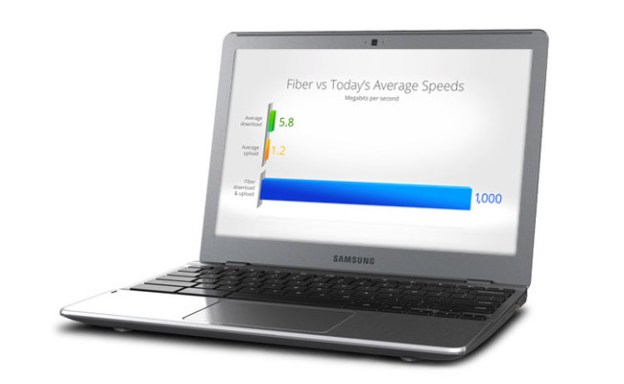
It appears Google Fiber remains top dog as far as U.S. Internet providers go for the month of March. According to the Netflix ISP Speed Index, the current Kansas-and-Missouri exclusive ISP streamed Netflix videos at an average rate of 3.45 megabits per second – roughly a 35 percent increase in speed since November, 2012. The bad news? Most of us still aren’t any closer to being able to use the service (unless you’re in Austin).
Notable runner-ups include Cablevision, at 2.39 Mbps, followed by Cox, at 2.25 Mbps, and Suddenlink, at 2.19 Mbps. Cox, the third largest cable provider in the U.S., managed to climb a whopping six positions in the rankings since January, while Comcast, Time Warner Cable, and few other ISPs remain stable after continually dropping several slots during the past several months.

On a global scale, Google Fiber remains the fastest ISP of the eight countries included in the index, followed by Sweden’s Ownit with an average bitrate of 2.95 Mbps. The index also revealed Netflix members in Finland tout the highest average bitrates, while Netflix members in Mexico exhibited the slowest streaming rates of anywhere the service is offered.
If being the fastest ISP isn’t enough, Google Fiber also offers the service for a mere $70 per month, or a $120 bundle that includes TV service and a free Nexus 7 tablet for remote use. That’s not too shabby for an ISP that set up shop less than a year ago, and it’s a tremendous deal compared to other similar high-speed Internet services (if you can call them that) like Cablevision and Verizon. For instance, the latter’s quickest package only offers 300 Mbps for roughly $200 a month.
Despite the current dismal speed offerings, ISPs across the country continue to tout that they’re capable of much quicker speeds, even 1-Gbps in some cases, while claiming that the consumer base for top-tier plans isn’t substantial enough to warrant implementing the required infrastructure. In January, Irene Esteves, Time Warner Cable’s Chief Financial Officer, said the company is already delivering 10-Gbps speeds to its business customers and would build up its product base if there was a greater demand for the faster speed packages.

The release of the new monthly data coincides with the launch of the new Netflix ISP Speed Index, a collection of international data that is updated on a monthly basis to compare ISPs from around the globe. So far, the index includes information from the U.S., Mexico, Ireland, UK, Norway, Sweden, Denmark, and Finland, and with more on the way. Even though the popular video-streaming service breaks down speeds for different regions, the data is based on the average streaming performance of more than 33 million Netflix accounts from around the globe.
Netflix is quick to point out that average performance falls below the peak performance due to a variety of factors including Netflix encodes, network conditions, and the types of devices members use to stream content. When comparing ISPs, these factors cancel each other out for a more accurate picture of streaming speeds.




